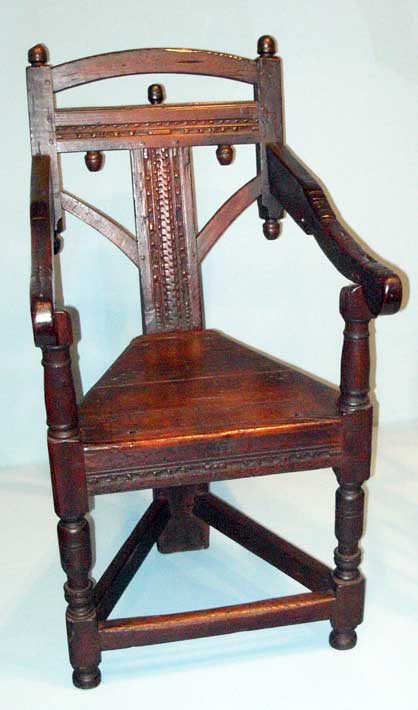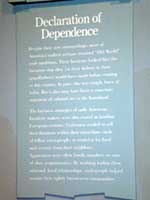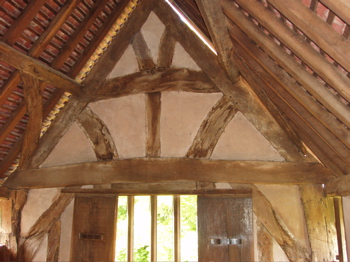
Of Chairs and Mills
The interconnection of trades in Colonial America
In early America, skilled workers were rare - partially because the
population was low to begin with, but also because skilled trademen were
prohibited from leaving England. Some master craftsmen did come,
however, and their skills became indispensable in building the new
colonies.
 In the Chipstone Gallery of Decorative Arts at the Milwaukee Art
Museum, a well-made chair is proudly displayed. Made in either Connecticut or Massachusetts between
1650 and 1680, this "Great Chair" (for most people had stools or much
simpler chairs if they were lucky) would have graced the head of a
wealthy landowner's or merchant's table. It is an exceptional char,
made of native hardwoods like oak, cherry, and ash, and intricately
carved on the back, arms, and front rail. What is particularly
interesting, however, is who made it. In the Chipstone Gallery of Decorative Arts at the Milwaukee Art
Museum, a well-made chair is proudly displayed. Made in either Connecticut or Massachusetts between
1650 and 1680, this "Great Chair" (for most people had stools or much
simpler chairs if they were lucky) would have graced the head of a
wealthy landowner's or merchant's table. It is an exceptional char,
made of native hardwoods like oak, cherry, and ash, and intricately
carved on the back, arms, and front rail. What is particularly
interesting, however, is who made it.
 The chair is attributed to John Elderkin* (1616-1687), one of the first colonial settlers from England, arriving in the Massachusetts Bay Colony in 1636 or 37, a mere 17 years after the Pilgrims first landed at Plymouth Rock. He stayed first at Lynn, MA, just north of Boston,
and then moved repeatedly in the next 30 years: to Reading, MA,
Providence, RI, and both New London and Norwich, CT. Elderkin was a
carpenter by trade, but he made his name, fame, and money in the new
world by building a number of mills in Massachusetts and Connecticut.
This hybrid career is evident in the chair's details, incorporating
hanging pendants on the back corners much like hammer beam supports on
contemporary roofs, and cruck-construction connecting the central
pillar of the back to the back corner posts (the diagonal members -
compare the roof truss in the 15th century manor house now preserved at
Avoncroft open-air museum in England shown at the bottom of the page).
The chair is attributed to John Elderkin* (1616-1687), one of the first colonial settlers from England, arriving in the Massachusetts Bay Colony in 1636 or 37, a mere 17 years after the Pilgrims first landed at Plymouth Rock. He stayed first at Lynn, MA, just north of Boston,
and then moved repeatedly in the next 30 years: to Reading, MA,
Providence, RI, and both New London and Norwich, CT. Elderkin was a
carpenter by trade, but he made his name, fame, and money in the new
world by building a number of mills in Massachusetts and Connecticut.
This hybrid career is evident in the chair's details, incorporating
hanging pendants on the back corners much like hammer beam supports on
contemporary roofs, and cruck-construction connecting the central
pillar of the back to the back corner posts (the diagonal members -
compare the roof truss in the 15th century manor house now preserved at
Avoncroft open-air museum in England shown at the bottom of the page).
The interplay between trades was relatively limited in European
cultures: professional conduct was often regulated by guilds which were
exclusive by their very nature; saturation of the market in many areas
meant that certain trades complained loudly when they felt their
territory was being encroached upon; and rivalries between the crafts
often created a social barrier for, say, a carpenter to become a
millwright or vice versa. In America on the other hand, the relative
scarcity of labor let — even demanded that — craftsmen do all the
necessary jobs and then some. It is worth noting that during the roughly 150 years of the existence of the American colonies before Independence, guilds never got a strong foothold here.

*On Elderkin, see a pamphlet by his great-great grandson, also named
John: John Elderkin, John Elderkin: one of the founders of Connecticut
and some of his descendants (New York, 1896).
Return to:
One-Minute Essays
 |
|

|